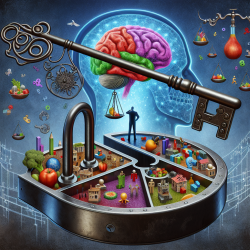Introduction
As practitioners in the field of mental health, it is imperative to continuously enhance our skills and understanding of legislative frameworks that govern our practice. The research article titled "Civil commitment of persons with mental illness: Comparison of the Mental Healthcare Act 2017 with corresponding legislations of the USA" provides a comprehensive comparison between the Indian Mental Healthcare Act (MHCA) of 2017 and mental health legislations in the USA. This analysis offers valuable insights into how different legislative approaches can impact patient care and the responsibilities of mental health professionals.
Key Comparisons and Insights
The article outlines several key differences and similarities between the MHCA 2017 and the mental health legislations in the USA, particularly using New York State Mental Hygiene Law as a reference point. Here are some noteworthy points:
- Patient Rights and Autonomy: Both legislations emphasize the importance of patient rights and autonomy. The MHCA 2017 focuses on the patient's rights to make informed decisions about their treatment, similar to the US legislation which mandates informed consent and the right to refuse treatment.
- Involuntary Admission: In the USA, involuntary admission is governed by strict criteria, including the risk of harm to self or others. The MHCA 2017 also incorporates similar criteria but emphasizes the least restrictive form of care, aligning with modern psychiatric practices.
- Legal Framework and Appeals: The MHCA 2017 introduces the Mental Health Review Board (MHRB) to oversee appeals against detention, whereas in the USA, patients have the right to a court hearing. This difference highlights the varied approaches to ensuring legal oversight in mental health care.
Implications for Practitioners
Understanding these legislative frameworks is crucial for practitioners aiming to improve their practice. Here are some ways practitioners can implement the insights from this research:
- Advocacy for Patient Rights: Practitioners should advocate for patient autonomy and informed consent, ensuring that patients are involved in their treatment decisions.
- Continuing Education: Engage in continuous learning about international mental health laws to better understand global best practices and adapt them to local contexts.
- Collaboration with Legal Experts: Work closely with legal professionals to navigate complex cases involving involuntary admissions and ensure compliance with legal standards.
Encouragement for Further Research
While this article provides a foundational understanding of the legislative differences, further research is encouraged to explore the practical implications of these laws in clinical settings. Practitioners can contribute to the body of knowledge by documenting their experiences and outcomes related to these legislative frameworks.
To read the original research paper, please follow this link: Civil commitment of persons with mental illness: Comparison of the Mental Healthcare Act 2017 with corresponding legislations of the USA.










